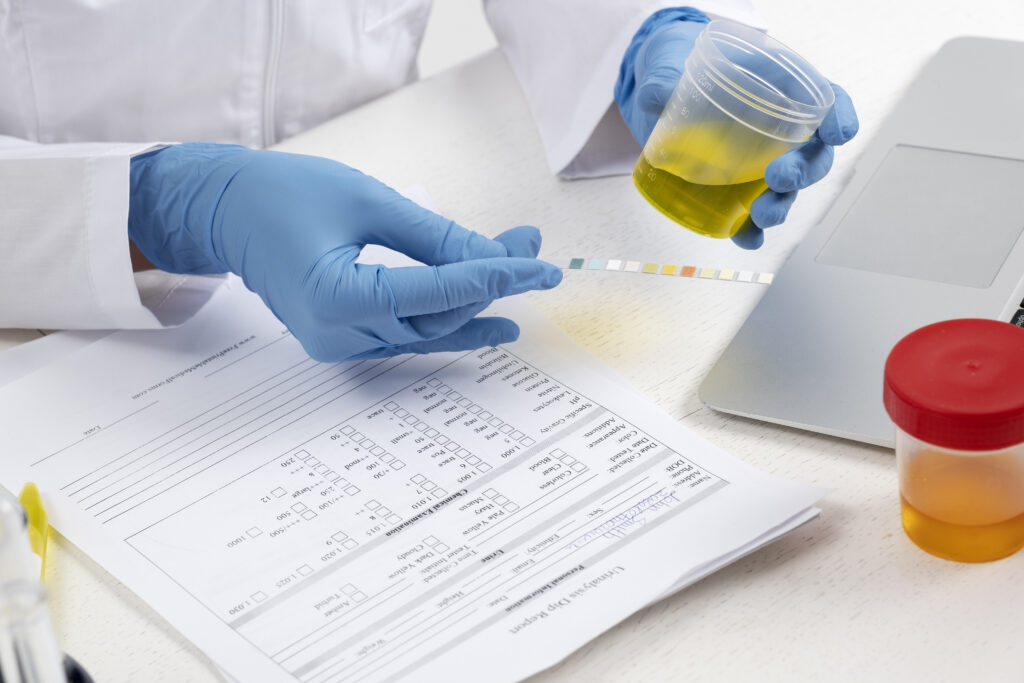Overview
High leukocytes in urine can indicate an infection such as a urinary tract infection or inflammatory medical condition, including kidney infection or stones.
High levels of white blood cells in urine, also referred to as leukocytes, are a vital part of the immune system. They help to protect the body against microbes and ward off infections.
High levels of leukocytes in the urine are not normal and hence require further investigation. If you are wondering what leukocytes in urine mean or are interested in the probable causes, this article will help you discover most of them.
What are leukocytes in urine?
Leukocytes or white blood cells are an integral part of the immune response that helps keep infections at bay. There are different types of leukocytes, and all play their unique role as a part of the immune system. Whenever an infection occurs in a specific area, WBCs usually migrate toward that area to defend it.
Primarily, that is the reason that high levels of leukocytes in the bloodstream or urine indicate an underlying infection. Abnormal leukocytes in urine indicate an infection of the bladder or the urinary tract or a kidney infection. However, kidney stones can also lead to white cells in urine as well.
A blood test helps detect high leukocyte levels in the bloodstream. In case of a urine infection, high levels of leukocytes in urine are a common finding.
What does it mean if leukocytes are high in urine?
If you have positive leukocytes in urine, the symptoms that are exhibited depend on the condition causing the abnormality.
In case UTI is the cause for leukocytes in urine, you may experience the following symptoms:
- burning sensation when urinating
- cloudy/ pink-tinted urine
- strong urine odor
- a frequent urge to urinate
- pelvic pain
If there is a blockage or kidney stones are the reason behind the high leukocyte count, the symptoms can include intense colicky pain, nausea or vomiting.
What causes leukocytes in urine?
High leukocyte levels in urine may be caused by the following conditions:
- Urinary tract infection (UTI)
- Kidney infection
- Kidney stones
- Obstruction in the urinary tract/bladder
- Tumor in the pelvic region
Medications that may cause leukocyte levels to increase include:
- steroids
- some antibiotics
- non-steroidal anti-inflammatory drugs (NSAIDs)
- proton-pump inhibitors (PPIs) i.e Omeprazole
Leukocytes in urine, but no infection, also known as sterile pyuria, cause high levels of white blood cells in urine without bacteria. This can be linked to tuberculosis (TB), autoimmune diseases typically, systemic lupus erythematosus (SLE), some sexually transmitted infections (STIs), cystitis or bladder cancer.
What is the normal range of leukocytes in urine?
- A normal range in the blood is 4,500–11,000 WBCs per microliter (µl).
- The normal levels of leukocytes in urine should be less than or equal to10 WBC per high power field (WBC/HPF).
In case there is a suspicion for a UTI or kidney stones, a urine sample is mainly tested for:
- WBCs
- red blood cells
- bacteria
- Leukocyte esterase
Levels above 10 WBC/HPF in urine indicate inflammation or an infection.
A urine culture helps confirm a bacterial infection and the type of organism causing the infection.
The sample of urine is analyzed in the following ways:
- Visual exam: Examination is done through the naked eye. Cloudiness or an unusual odor usually indicates an infection, such as a UTI.
- Dipstick test: A plastic stick with strips of chemicals is dipped into the sample of the urine to detect abnormalities. The strip changes color confirming the presence of certain substances. Leukocyte esterase in urine means that leukocytes/WBCs in the urine are present.
- Microscopic exam: Urine droplets are examined under a microscope, and the presence of high leukocytes suggests an infection.
Furthermore, imaging such as an X-ray or CT scan may be done to visualize kidney stones.
Treatment for leukocytes in the urine will vary according to the underlying cause. Infections such as UTIs or bladder infections are treated with antibiotics. For severe infections, hospitalization may be required.
When to consult a doctor?
High levels of leukocytes in the urine usually mean a urinary tract infection.
However, there are potential other causes that can cause high leukocytes. Hence, it is essential to talk to a doctor in order to start treatment or decide the next course of action for you. Talk to our doctor at Your Doctors Online for consultation, diagnosis, and treatment.
FAQs about the leukocytes in urine
High leukocytes in urine can indicate an infection such as a urinary tract infection or inflammatory medical condition, including kidney infection or stones. Finding the cause behind abnormal leukocytes is essential so that treatment can be initiated accordingly.
Leukocyte esterase can be present in the urine in cases of inflammation or kidney stones. Leukocyte esterase is released by white blood cells (WBCs) in urine, indicating that leukocytes are present. The normal leukocyte count in urine is supposed to be less than 5 cacells/HPF.
Acute emotional or physical stress has been known to increase the white blood cells counts. Hence, any state that puts a body in the state of stress such as anxiety or pregnancy can lead to leukocytosis.
Vitamins and minerals that are beneficial for the immune system, such as zinc, Vitamin B-12, vitamin D, Vitamin C, folate, and selenium, are all good for white cell production.







